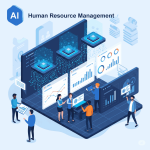Artificial Intelligence (AI) is no longer a futuristic concept but a present-day reality reshaping industries worldwide — and Human Resource Management (HRM) is no exception. In recent years, AI technologies have profoundly influenced how organizations attract, retain, and manage talent, making HR processes more efficient, data-driven, and employee-centric. This transformation is not just about automating routine tasks but fundamentally changing the strategic role of HR in organizations.
1. AI in Recruitment: Smarter and Faster Hiring
One of the most visible impacts of AI in HR is in recruitment. Traditional recruitment methods are time-consuming and often biased. AI-powered Applicant Tracking Systems (ATS) and recruitment chatbots streamline candidate screening by quickly analyzing resumes and matching qualifications with job requirements. Moreover, AI algorithms can help reduce unconscious bias by focusing on skills and experience rather than demographics, promoting diversity and inclusion.
However, this reliance on AI also raises questions: Can algorithms unintentionally perpetuate existing biases in data? How do we ensure transparency in AI-driven hiring decisions? These concerns spark important debates about the ethical use of AI in recruitment.
However, this reliance on AI also raises questions: Can algorithms unintentionally perpetuate existing biases in data? How do we ensure transparency in AI-driven hiring decisions? These concerns spark important debates about the ethical use of AI in recruitment.
2. Enhancing Employee Engagement and Experience
Beyond hiring, AI tools are transforming employee engagement. Virtual assistants and AI-driven platforms provide personalized support to employees, from answering HR-related queries to assisting with training recommendations. Sentiment analysis tools monitor employee feedback and workplace sentiment in real-time, enabling HR to proactively address issues such as burnout or dissatisfaction.
This data-driven approach empowers HR teams to make informed decisions that improve workplace culture and productivity. Yet, it also prompts critical reflection on privacy: How much employee data should AI systems access, and where do we draw the line between helpful monitoring and invasive surveillance?
This data-driven approach empowers HR teams to make informed decisions that improve workplace culture and productivity. Yet, it also prompts critical reflection on privacy: How much employee data should AI systems access, and where do we draw the line between helpful monitoring and invasive surveillance?
3. Performance Management and Learning
AI is redefining traditional performance appraisals, shifting from infrequent reviews to continuous, real-time feedback. AI-powered analytics assess employee performance based on objective metrics and can identify skill gaps and career development opportunities. Personalized learning paths generated by AI help employees upskill efficiently, aligning their growth with organizational goals.
However, some argue that over-reliance on AI metrics might dehumanize performance evaluation, neglecting the nuances of human creativity, motivation, and teamwork.
However, some argue that over-reliance on AI metrics might dehumanize performance evaluation, neglecting the nuances of human creativity, motivation, and teamwork.
4. Strategic Decision-Making and Workforce Planning
AI's ability to analyze large datasets supports strategic HR planning, such as forecasting workforce needs, succession planning, and optimizing talent allocation. Predictive analytics can anticipate employee turnover risks, enabling preemptive retention strategies. This proactive approach helps companies stay competitive in dynamic markets.
Still, the challenge remains to balance AI-driven insights with human judgment. The future HR leader must blend technology with empathy, ethics, and cultural awareness.
Still, the challenge remains to balance AI-driven insights with human judgment. The future HR leader must blend technology with empathy, ethics, and cultural awareness.
Conclusion
AI is undeniably shaping the future of HR management by enhancing efficiency, decision-making, and employee experience. However, this evolution comes with challenges — ethical considerations, privacy concerns, and the risk of losing the “human” in Human Resources. As AI continues to advance, the most successful organizations will be those that harness technology to complement human insight rather than replace it.
This discussion invites HR professionals, business leaders, and technologists to engage critically with AI's role in the workplace. How can we leverage AI responsibly to create fairer, more inclusive, and dynamic work environments? The answer lies in continuous dialogue, thoughtful implementation, and a shared commitment to human-centered innovation.
This discussion invites HR professionals, business leaders, and technologists to engage critically with AI's role in the workplace. How can we leverage AI responsibly to create fairer, more inclusive, and dynamic work environments? The answer lies in continuous dialogue, thoughtful implementation, and a shared commitment to human-centered innovation.

